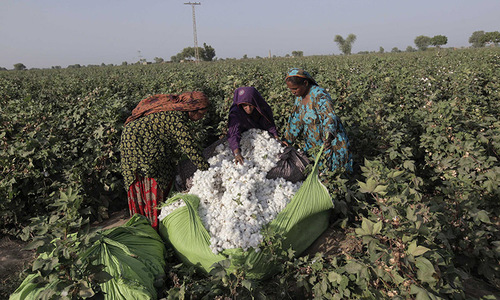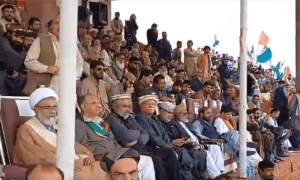Sitting on her haunches, Rubina Bibi, mother of five skillfully brings the two ends of the glass bangles to flame and lets them fall one by one.
A home-based worker (HBW) in Hyderabad, putting in anywhere between eight to 10 hours, Bibi earns less than a dollar a day. It is estimated that there are nearly 12 million women HBWs in Pakistan, with over three million in urban areas and 8.5 million in rural areas.
"I do welding work. For each bundle comprising 365 bangles, I get Rs9," Bibi says. She can do as many as 10 such bundles in a day earning Rs90. But it's just too little in these times of escalating food prices, she says.
In the same neighbourhood, Azra Bibi, a young widow and mother of four, embellishes the bangles with paint. Like Rubina, she knows all too well that she is being exploited by the middlemen, but is too scared to ask them for a raise. Risk of job loss and mounting food prices are ample reasons for them to hide their discontent.
"And when we do ask the contractor for an increase, he says if the wages don't suit us we can quit," the young woman points out.
This is the condition of women workers in Pakistan, although the situation is no better in other countries of the region.
To highlight their plight, Oxfam launched a new report on June 1, on the eve of the World Economic Forum-Asia in Malaysia, “Underpaid and Undervalued: How Inequality Defines Women's Work in Asia”, in which it states that Asian women’s wages comprise anywhere between 70 and 90 per cent of men’s wages.
No doubt the region has experienced high economic growth (between 1990 and 2015, Asia's economy grew on average 6 per cent a year), but it has been at the cost of extreme economic inequality and has failed to eliminate poverty.

The bottom 70 per cent has grown poorer while the top 10 per cent has grown richer. "Low wages and a lack of rights at work, particularly for women, are at the heart of this scandal," states the report.
The long working hours have taken a definite toll on women's health.
Take Nafisa Zafar, 45, also working in the bangle industry for instance. A mother of seven, she complains of blurry vision and chronic back ache.
"I have a continuous pain in my legs and joints," she points to her lower back, adding that she finds it difficult to get up and stand straight after work.
The total size and distribution of the labour force participation in Pakistan, according to the Labour Force Survey 2014-15 is:
- Formal: 27.43 % i.e. 9.08 million
- Informal 72.57% i.e. 24.06 millions
- Agriculture 42.27% i.e. 24.27 millions
- Non agriculture 57.73% i.e. 33.15 millions
Oxfam spokesperson Mustafa Talpur conceded that there is a large concentration of women in home based work as well as informal work, but unfortunately, due to the nature of work they have so far been unable to organise themselves to bargain for better wages and working conditions.

"Not having any meaningful agrarian reform, women's work in agriculture sector is unaccounted, undervalued and underpaid," he said.
There was need for urgent action to invest in care economy in urban areas to reduce unpaid care work of women, ensure living wages, bring large agriculture workers into formal labour purview, and above all, organise and train women workers to collectively bargain living wages and better working conditions, Talpur added.
"They face multiple challenges with a majority ending up working in informal sector getting inadequate wages and unable to benefit from social protection/security programmes," he said.

According to the Global Gender Gap Index, 2015, Pakistan stands at the bottom — 144 out of 145 countries in the world. The annual index, prepared annually by the World Economic Forum, measures the gap through looking at economic participation and opportunity, educational attainment, health and survival, and political empowerment.
Leaving aside the other three when economic participation and opportunity is taken for Pakistan it appears that the country has failed on all five aspects — labour force participation; wage equality for similar work; estimated earned income; number of legislators; senior officials managers, and number of professional and technical workers.
According to the LFS, 2014-2015, the female labour force participation rate is 22% compared to that for men at 67.8%; women are paid 23%c less than men for similar work; women’s average monthly income is Rs9,760 compared to men’s monthly earnings of Rs15,884, and only 0.3% women are employed as managers, 6.4% as professionals and 0.9% as technical workers.
In addition, women tend to earn less for doing the same types of jobs as men. In Bangladesh, women earn an average of 23.1 % less per hour than men for the same kind of jobs. In Pakistan in 2012, male agricultural workers earned $2.97 per day while female agricultural workers earned $1.68 per day.
But it's women workers who are doubly burdened. The unpaid domestic chores — cooking, cleaning, washing clothes, caring for dependants, tending to livestock, fetching water and firewood, that women across the region carry out is 2.5 times the amount that men do.

In Bangladesh, for example, women spend on average 3.6 hours a day on unpaid care and domestic work, compared to 1.4 hours for men and in Pakistan, women spend 4.3 more hours per day than men on this work. Conservative estimates put the time women spend on unpaid care work at $10 trillion a year.
Equal wages for equal work
Although almost all countries in Asia have minimum wage laws and policies, however, these wage laws do not meet the goal of reducing poverty and inequality, because they have been set too low, the report points out. In Punjab the minimum wage is set at Rs 13,000 and in Khyber Pakhtunkhwa it is Rs 15,000 for an unskilled worker.
In addition, wage theft is rampant because implementation to enforce these laws is weak and the law breakers go unpunished. Further, minimum wages may often not be applicable to many forms of women's work. For example, the unregistered agricultural workers or those employed in factories as informal workers as is the case in Pakistan.

In fact, Ume Laila Azhar, executive director of HomeNet Pakistan, a membership-based organisation for HBWs and domestic workers created in 2005, says she was shocked to find that in several factories whereas there are as many as 230 informal workers, only 40 are registered with the social security institutes.
The same was pointed out by Zeenat Hisam of Pakista Institute of Labour Education and Research, in Karachi.
In Pakistan there are at least three standalone policies on the minimum wages. In India, the Minimum Wage Act of 1948 provides the mandate for government to establish floor wages in some sectors, and throughout the country.
In China, Cambodia and Vietnam, there is no separate legislation on minimum wage, but the mandate for establishing this is drawn from provisions from broader labour legislation, or enforced through executive policies and ordinances. Myanmar, one of the last few countries in the region to establish this type of policy, finally approved its first minimum wage for workers in August 2015.
"The situation of poor women [in Pakistan] can be turned around by effective implementation of these policies and by redistributing women’s unpaid care work," said Oxfam's Pakistan country director, Mohammed Qazilbash.
HomeNet Pakistan's spokesperson said that in Punjab, at least, a Provincial Anti Discrimination (Employment and Occupation) Act 2015 has been drafted which will predominantly look into equal remuneration for men and women. "The draft bill had been shared with Minister for Women development Punjab and she has committed to push for its approval once the home based workers policy is approved.
Sindh will hopefully be next. We look forward to the new labour and gender sensitive policies and legislation in Punjab and in Pakistan," said Azhar who has been part of the consultative process.














































